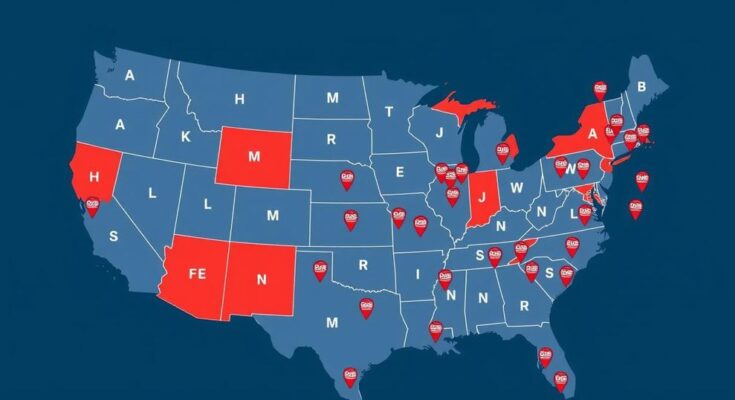Republicans are close to achieving a majority in the House, with 213 seats confirmed and 20 races remaining uncalled. Their potential unified control, alongside Trump’s election, may enable significant legislative action focused on fiscal and immigration issues. Meanwhile, Trump has excluded Pompeo and Haley from his upcoming administration, signaling a shift in foreign policy priorities as he prepares for his January 2025 inauguration.
The Republican Party is increasingly close to achieving unified control over the United States government, having secured another seat in the House of Representatives. With the reelection of Congressman Eli Crane in Arizona’s second district, the Republicans now hold 213 seats, just five seats shy of the 218 needed for a majority. There remain 20 uncalled races, many of which are considered competitive and predominantly located in western states, where vote-counting is known to be slower. In contrast, Democrats have obtained 202 seats, following a victory by April McClain Delaney in Maryland’s sixth congressional district. The context surrounding this election is significant, particularly with the accompanying presidential election victory of Donald Trump on November 5. Should Republicans maintain control of the House and secure a majority in the Senate, they will be positioned to heavily influence a legislative agenda centered on fiscal initiatives, energy regulation, and immigration policies. Currently, Republicans lead in several tight races in states such as Arizona, Colorado, and Iowa, while Democrats hold leads in several districts in Ohio, Maine, and Oregon. Despite these contest dynamics, reports suggest that even some Democrats acknowledge the likelihood of Republican retention of their House majority by 2025. In parallel to the political races, Donald Trump has been actively engaging with prospective candidates for key government roles but has publicly decided against inviting former Secretary of State Mike Pompeo and former UN Ambassador Nikki Haley back into his administration. Trump has expressed a commitment to addressing U.S. foreign policy differently than his predecessors, specifically regarding aid to Ukraine. Trump announced that his 2025 presidential inauguration will be co-chaired by notable figures from the business and political arenas, marking the commencement of his second non-consecutive presidential term on January 20, 2025.
The political landscape in the United States is undergoing a significant shift, particularly after recent elections that may solidify Republican control within the government. These elections not only impact the legislative assembly but also shape policy direction on various pivotal issues facing the nation, including economy, immigration, and foreign relations. The near-unification of power amongst Republicans could allow them to enact sweeping reforms reflective of their party platform, particularly as they prepare to confront future challenges in governance.
In summary, Republicans are on the verge of gaining unified control within the U.S. government, pending the outcome of remaining uncalled races. With significant victories already secured, a strong legislative agenda is expected should they attain a majority in Congress. Concurrently, Donald Trump is shaping the future direction of his administration, indicating shifts in foreign policy and the structure of his forthcoming presidency. The coming months will undoubtedly see critical developments in both the political landscape and the implementation of policies that will define the next term.
Original Source: www.aljazeera.com




